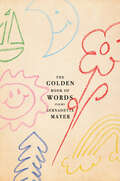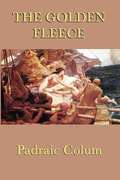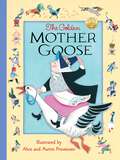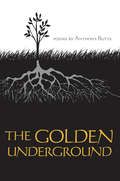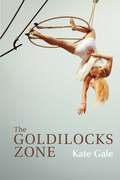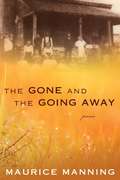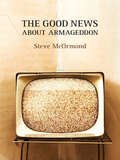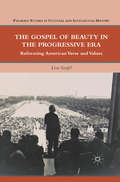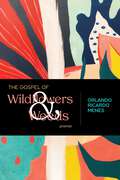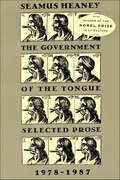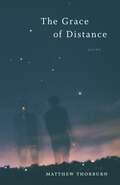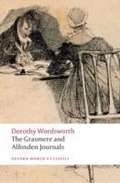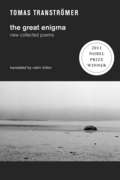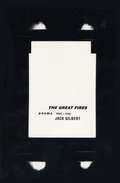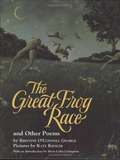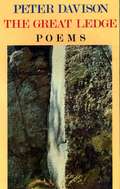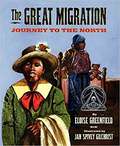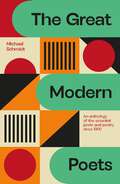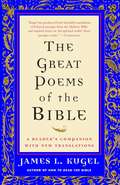- Table View
- List View
The Golden Book of Words
by Bernadette MayerHere at last is a new edition of a famous early work by Bernadette Mayer, one of the most beloved, radical, and witty American poets This landmark early book (its original printing by Angel Hair Books was 750 copies, and they are now extremely rare) by the late great Bernadette Mayer is finally available again, both as a tribute and a joy to read. Mayer was a marvelous poet in every stage of her long and prolific writing life, but many fans most admire her restless, powerful, sexy, and erudite early work. One of her signal elements is a certain deadpan wit, on full display here with classics such as “Lookin’ Like Areas of Kansas” or “What Babies Really Do,” or the marvelous “Essay”: I guess it’s too late to live on the farm I guess it’s too late to move to a farm I guess it’s too late to start farming I guess farming is not in the cards now… I guess farming is really out … I don’t want to be a farmer but my mother was right I should never have tried to rise out of the proletariat Unless I can convince myself as Satan argues with Eve That we are among a proletariat of poets of all the classes Each ill-paid and surviving on nothing Or on as little as one needs to survive Steadfast as any farmer and fixed as the stars Tenants of a vision we rent out endlessly
The Golden Fleece
by Padraic ColumThe Argonautica is the dramatic story of Jason's quest for the Golden Fleece and his relations with the dangerous princess Medea. The only surviving Greek epic to bridge the gap between Homer and late antiquity, this epic poem is the crowning literary achievement of the Ptolemaic court at Alexandria, written by Appolonius of Rhodes in the third century BC. Appollonius explores many of the fundamental aspects of life in a highly original way: love, deceit, heroism, human ignorance of the divine, and the limits of science, and offers a gripping and sometimes disturbing tale in the process. This major new prose translation combines readability with accuracy and an attention to detail that will appeal to general readers and classicists alike.
The Golden Gate
by Vikram Seth"The great California novel been written, in verse (and why not?): The Golden Gate gives great joy."--Gore Vidal One of the most highly regarded novels of 1986, Vikram Seth's story in verse made him a literary household name in both the United States and India. John Brown, a successful yuppie living in 1980s San Francisco meets a romantic interest in Liz, after placing a personal ad in the newspaper. From this interaction, John meets a variety of characters, each with their own values and ideas of "self-actualization." However, Liz begins to fall in love with John's best friend, and John realizes his journey of self-discovery has only just begun. "A splendid achievement, equally convincing in its exhilaration and its sadness."--The New York Times "Seth pulls off his feat with spirit, grace and great energy."--The New Yorker "A marvelous work . . . bold and splendid . . . Locate this book and allow yourself to become caught up, like a kite, in the lifting effects of Seth's sonnets."--Washington Post Book World
The Golden Mother Goose
by Alice Provensen Martin ProvensenA Golden classic, proudly reissued in celebration of the 75th anniversary of Golden Books! Every home needs a book of Mother Goose rhymes! They&’re a child&’s introduction to poetry and a love of language. This Golden Books edition, originally published in 1948, features over a hundred lively rhymes and splendid illustrations by Caldecott Medalists Alice and Martin Provensen. The original artwork has been digitally restored for this edition—resulting in a stunning, best-ever reproduction! It makes a beautiful gift for a beloved child, sure to be read again and again.
The Golden Treasury of Indo-Anglian Poetry, 1828-1965
by Vinayak Krishna GokakThis is the comprehensive anthology of English verse written by Indians, compiled and edited by poet and a critic of distinction. Such a volume is of considerable historical value and contemporary interest, for English has been for more than 150 years, and continues to be, a vehicle of creative expression for many of our poets and writers.
The Golden Underground: Golden Underground
by Anthony ButtsNew from accomplished poet Anthony Butts, a collection of modern free verse with an attention to formal syntax and a keen religious sensibility.
The Goldilocks Zone (Mary Burritt Christiansen Poetry Series)
by Kate Gale&“Welcome to Kate Gale&’s world. There are glass houses, a glass orchestra, sex on the roof. . . . Kate Gale knows her Bible and plays whatever music she wants on that musical instrument—but her música is always fresh, and it achieves wisdom.&”—Ilya Kaminsky, author of Dancing in Odessa&“The clipped jumpy rhythm of these poems with their sudden bursts of syntax prove repeatedly that Kate Gale possesses a poetic tone and pace all her own. She is also refreshingly out of step with today&’s poetry of self-absorption, for she is fascinated less by her ego than by the strange variety of the world around us.&”—Billy Collins, former U.S. Poet Laureate
The Gone and the Going Away
by Maurice ManningWelcome to "Fog Town Holler," Pulitzer Prize finalist Maurice Manning's glorious rendering of a landscape not unlike his native Kentucky. Conjuring this mythical place from his own roots and memories -- not unlike E. A. Robinson's Tilbury Town or Faulkner's Yoknapatawpha County -- Manning celebrates and echoes the voices and lives of his beloved hill people.In Fog Town Holler men have "funny names," like Tiny Too and Eula Loom. A fox is known as Redleg Johnny. A neighbor issues a complaint against an early-rising rooster; another lives in the chicken coop. "Lawse," a woman exclaims, "the sun can't hardly find this place!" But they feel the Lord watching, always, as the green water of Shoestring Branch winds its way through hillbilly haunts and memories.The real world no longer resembles the one brought so vividly to life in the poems in these pages, but through his meditations on his boyhood home, Manning is able to recapture what was lost and still, yet, move beyond it. He brings light to this place the sun can't find and brings a lost world beautifully, magically, once again into our present.
The Good News about Armageddon
by Steve McOrmondPoems that occupy the difficult territory of contemporary crisis with great candour and trenchant wit. Steve McOrmond’s unflinching take on contemporary life, with its saturnine candour and ironic focus, may remind readers of the anti-poetry of Europeans like Zbigniew Herbert: intense, humanistic and deeply sceptical of inflationary gestures or stagy rhetoric. Shedding illusions, but equally refusing the consolations of despair, McOrmond’s well-tempered satire is carried home on its own crisp music. The title poem has, as it narrative background, the encounter between the narrator and a young door-to-door missionary, one who sets his worldly and jaded scepticism against her innocence and faith. The Good News about Armageddon poses questions that are difficult and durable (“In these hours of prolific / doubt, how will we acquit ourselves?”), as well as those that are topical (“Are Paris Hilton’s 15 minutes over yet?”) and probes with accurate wit (“We are an argument / for unintelligent design”). This is essential poetry for our time – astute, informed, bitingly satirical, yet grounded in its quest for words that, like Cordelia’s, reverb no hollowness.
The Goodnight Train Rolls On!
by June SobelAll aboard! The story of the Goodnight Train continues in this &“perfectly charming&” bedtime picture book (Kirkus Reviews). When a herd of poky sheep slows the Goodnight Train to a crawl, the Engineer&’s quick thinking (and counting!) has them rolling along in no time—until one tricky sheep sends the train and its sleepy passengers tossing and turning! The clickety-clack cadence of the poetic text is sure to lull listeners to sleep, but not before they take in the candy-colored landscapes full of delightful details. All aboard—next stop Dreamland! This colorful companion to The Goodnight Train is leaving the station with new nighttime hijinks and all the rhyme and rhythm that made the first book a bedtime read-aloud favorite.
The Gospel of Beauty in the Progressive Era
by Lisa SzefelSzefel investigates the use of poetry in addressing political reform at the turn of the twentieth century. It charts the work of poets and editors - many of whom were women and minorities - who created a network of organizations to nurture writers who addressed the problems wrought by Progressive-era capitalism.
The Gospel of Wildflowers and Weeds: Poems (Mary Burritt Christiansen Poetry Series)
by Orlando Ricardo MenesThe poems in The Gospel of Wildflowers and Weeds expand the sacred within a baroque, magical-realist poetics that immerses itself in the flora and fauna of the Caribbean and the region&’s complex interplay of African, Judeo-Christian, and Taíno (Arawak) cultures. Menes engages with the Catholic sacraments, saints&’ lives, and the artistic heritage of this universal faith as well as Cuban art through the use of a variety of poetic styles across the collection. An established poet, he pays homage to those writers who have made him the Caribbean poet that he is, specifically Alejo Carpentier, José Lezama Lima, and even Hart Crane. Readers will want to join Menes on this journey as he travels the globe to explore the fantastic and the marvelous while searching for faith and divine grace.
The Government of the Tongue: Selected Prose, 1978–1987
by Seamus HeaneyIn his volume of critical essays The Government of the Tongue, Seamus Heaney scrutinizes the poetry of many masterful poets. Throughout the collection, Heaney's gifts as a wise and genial reader are exercised with characteristic exactness, and we are reminded, above all, of the essentially gratifying nature of poetry itself.
The Grace of Distance: Poems
by Matthew ThorburnIn The Grace of Distance, his poignant, far-traveling new collection of poems, Matthew Thorburn explores the ways in which we try to close the distances we experience in modern life—between doubt and faith, between cultures, between ourselves and those we love. He seeks to name, and find, that elusive, essential sense of connection humanity hungers for. In one poem, a boy places a bell in the hollow of a tree so someone might find it. In others, an overworked baker wishes for an annunciation of her own, while a man calls down into a well until another voice calls back. Set in China and America, in the present and the distant past, Thorburn’s poems examine both Eastern and Western ideas of spirituality, looking closely at the ways we can lose faith, then sometimes find it again. The poems also confront the unbridgeable distances we must live with and the perhaps surprising grace they can provide—a greater sense of perspective, understanding, and peace—even as our lives move in the only direction they can, away from the past.
The Grasmere and Alfoxden Journals
by Dorothy Wordsworth Pamela WoofDorothy Wordsworth's journals are a unique record of her life with her brother William, at the time when he was at the height of his poetic powers. Invaluable for the insight they give into the daily life of the poet and his friendship with Coleridge, they are also remarkable for their spontaneity and immediacy, and for the vivid descriptions of people, places, and incidents that inspired some of Wordsworth's best-loved poems. The Grasmere Journal was begun at Dove Cottage in May 1800 and kept for three years. Dorothy notes the walks and the weather, the friends, country neighbors and beggars on the roads; she sets down accounts of the garden, of Wordsworth's marriage, their concern for Coleridge, the composition of poetry. The earlier Alfoxden Journal was written during 1797-8, when the Wordsworths lived near Coleridge in Somerset. Not intended for publication, but to "give Wm Pleasure by it," both journals have a quality recognized by Wordsworth when he wrote of Dorothy that "she gave me eyes, she gave me ears."
The Great Enigma: New Collected Poems
by Tomas Transtromer Robin FultonThe collected poems of one of the world's greatest living writers, Tomas Transtromer, available in this comprehensive edition. In day's first hours consciousness can grasp the world as the hand grips a sun-warmed stone. <P><P> Translated into fifty languages, the poetry of Tomas Transtromer has had a profound influence around the world, an influence that has steadily grown and has now attained a prominence comparable to that of Pablo Neruda's during his lifetime. But if Neruda is blazing fire, Transtromer is expanding ice. The Great Enigma: New Collected Poems gathers all the poems Tomas Transtromer has published, from his distinctive first collection in 1954, 17 Poems, through his epic poem Baltics ("my most consistent attempt to write music"), and The Sad Gondola, published six years after he suffered a debilitating stroke in 1990 ("I am carried in my shadow / like a violin / in its black case."), to his most recent slim book, The Great Enigma, published in Sweden in 2004. Also included is his prose-memoir Memories Look at Me, containing keys into his intensely spiritual, metaphysical poetry (like the brief passage of insect collecting on Runmaro Island when he was a teenager). Firmly rooted in the natural world, his work falls between dream and dream; it probes "the great unsolved love" with the opening up, through subtle modulations, of "concrete words."
The Great Fires: Poems, 1982-1992
by Jack GilbertJOYCE'S MOTTO has had much fame but few apostles. Among them, there has been Jack Gilbert and his orthodoxy, a strictness that has required of this poet, now in the seventh decade of his severe life, the penalty of his having had almost no fame at all. In an era that puts before the artist so many sleek and official temptations, keeping unflinchingly to a code of "silence, exile, and cunning" could not have been managed without a show of strictness well beyond the reach of the theater of the coy. The "far, stubborn, disastrous" course of Jack Gilbert's resolute journey--not one that would promise in time to bring him home to the consolations of Penelope and the comforts of Ithaca but one that would instead take him ever outward to the impossible blankness of the desert--could never have been achieved in the society of others. What has kept this great poet brave has been the difficult company of his poems--and now we have, in Gilbert's third and most silent book, what may be, what must be, the bravest of these imperial accomplishments.
The Great Fires: Poems, 1982-1992
by Jack GilbertJOYCE'S MOTTO has had much fame but few apostles. Among them, there has been Jack Gilbert and his orthodoxy, a strictness that has required of this poet, now in the seventh decade of his severe life, the penalty of his having had almost no fame at all. In an era that puts before the artist so many sleek and official temptations, keeping unflinchingly to a code of "silence, exile, and cunning" could not have been managed without a show of strictness well beyond the reach of the theater of the coy. The "far, stubborn, disastrous" course of Jack Gilbert's resolute journey--not one that would promise in time to bring him home to the consolations of Penelope and the comforts of Ithaca but one that would instead take him ever outward to the impossible blankness of the desert--could never have been achieved in the society of others. What has kept this great poet brave has been the difficult company of his poems--and now we have, in Gilbert's third and most silent book, what may be, what must be, the bravest of these imperial accomplishments. From the Trade Paperback edition.
The Great Frog Race and Other Poems
by Kristine O'Connell GeorgeA fresh collection of twenty-eight poems about a girl living in the country.
The Great Ledge
by Peter DavisonJames Dickey, in reviewing Peter Davison's last book, Praying Wrong: New and Selected Poems, 1957-1984, said, ' Davison will not let things break him. His voice is his; he has earned it and can use it, and as a result is surely one of our better poets.' That sense of this poet's singularity is one of the great strengths of this new book; these deeply felt poems are uniquely his. From the almost unbearably moving 'Equinox 1980, ' which opens the book, to the delightful 'Peaches, ' The Great Ledge confirms the remark of Vernon Young that Davison is 'one of the few poets of the first order writing in English today.'
The Great Migration: Journey to the North
by Eloise Greenfield Jan Spivey Gilchrist<p><i>We were one family among the many thousands. Mama and Daddy leaving home, coming to the city, with their hopes and their courage, their dreams and their children, to make a better life.</i> <p>When Eloise Greenfield was four months old, her family moved from their home in Parmele, North Carolina, to Washington, D.C. Before Jan Spivey Gilchrist was born, her mother moved from Arkansas and her father moved from Mississippi. Both settled in Chicago, Illinois. Though none of them knew it at the time, they had all become part of the Great Migration. <p>In this collection of poems and collage artwork, award winners Eloise Greenfield and Jan Spivey Gilchrist gracefully depict the experiences of families like their own, who found the courage to leave their homes behind during The Great Migration and make new lives for themselves elsewhere. The Great Migration concludes with a bibliography.</p>
The Great Modern Poets: An anthology of the essential poets and poetry since 1900
by Michael SchmidtAn essential introduction to the most significant poems and their works since 1900Reproduced within this collection are some of the greatest poems of the 20th century, featuring works from major writers such as T.S. Eliot and Sylvia Plath to Langston Hughes and W.B. Yeats. For each, Michael Schmidt provides an insight into their themes and the background to their work, opening for the reader a deeper understanding and enjoyment of these extraordinary poems.Poets include:W.B. YeatsRobert FrostEdward ThomasPhilip LarkinT.S. EliotTed HughesLangston HughesSylvia PlathC.S SissonDerek WalcottEzra Pound& many more!
The Great Modern Poets: An anthology of the essential poets and poetry since 1900
by Michael SchmidtAn essential introduction to the most significant poems and their works since 1900Reproduced within this collection are some of the greatest poems of the 20th century, featuring works from major writers such as T.S. Eliot and Sylvia Plath to Langston Hughes and W.B. Yeats. For each, Michael Schmidt provides an insight into their themes and the background to their work, opening for the reader a deeper understanding and enjoyment of these extraordinary poems.Poets include:W.B. YeatsRobert FrostEdward ThomasPhilip LarkinT.S. EliotTed HughesLangston HughesSylvia PlathC.S SissonDerek WalcottEzra Pound& many more!
The Great Poems of the Bible: A Reader's Companion with New Translations
by James L. KugelFrom the Psalms to the Prophets, from job to Ecclesiastes, much of the Bible is written in poetry. The poems of the Bible include some of its best known and most beloved passages: "The Lord is my shepherd," "Let justice roll down like waters," "By the rivers of Babylon," "Remember your Creator," "Arise, shine, for thy light is come!" These poems live in the hearts of those who are familiar with the Bible and offer rich rewards to anyone who is approaching the world's greatest book for the first time.In The Great Poems of the Bible, Harvard scholar James Kugel presents original translations of the most beautiful and important poems of the Scripture. Taken together, these poems represent the very essence of the Hebrew Bible. Reading them one after another is like taking a guided tour through Scripture, meeting firsthand some of its most important teachings and opening the way to an understanding of the Bible as a whole.Each poem is accompanied by an eloquent and accessible explanation of the poem's language, and a reflection on its meaning. These learned, compact essays introduce readers to the broader spiritual world of ancient Israel. What did people in biblical times believe about God? Where is a person's soul located and what does it do? Is there an afterlife? How does one come to "know" God? Why wasn't Eve meant to be Adam's "helpmate" (Kugel shows how this was just a translator's slip-up), and what does the Bible have to say about the role of women?Kugel's sparkling translations of the poems, together with the fascinating insights that accompany them, distill the very best that the Bible and modern scholarship have to offer. Kugel brings new life to some of history's greatest poems, and offers a new look at a Bible we thought we already knew. Here, in one volume, is a "Bible's bible" that belongs in every home.
